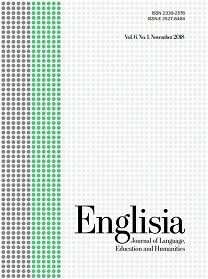DEVELOPING PRAGMATIC COMPETENCE OF INDONESIAN EFL LEARNERS THROUGH TEACHING SPEECH ACTS OF ORAL AND WRITTEN COMPLAINTS
DOI:
https://doi.org/10.22373/ej.v6i1.3167Keywords:
pragmatic competence, pragmatic awareness, speech acts, complaints, Indonesian EFL learnersAbstract
The lack of pragmatic competence could result in unexpected effects on the speakers; for example, the speakers are considered as rude and aggressive people. Accordingly, developing pragmatic competence for EFL learners should be a great concern. This article is aimed to fill in the needs of pragmatic teaching by providing examples of teaching practices that could be used to develop EFL learners’ pragmatic competence. There are two tasks that have been designed by drawing on discourse processing framework proposed by Celce-Murcia and Olshtain (2000) to achieve the production of both written and spoken discourses. The first task is on speaking, particularly on the speech act of oral complaints. The second task is on writing a letter of complaint. This article suggests that developing pragmatic awareness through the speech act of oral and written complaints is desirable.
Downloads
References
Aridah, A. (2001). Politeness phenomena as a source of pragmatic failure in English as a second language. TEFLIN Journal, 12(2), 149-166.
Celce-Murcia, M., & Olshtain, E. (2000). Discourse and context in language teaching: A guide for language teachers. Cambridge, England: Cambridge University Press.
Celce-Murcia, M. (2007). Rethinking the role of communicative competence in language teaching. In Soler, E. A., & Jordà, P. S. (Eds.). Intercultural language use and language learning (pp. 41-57). Amsterdam: Springer.
Hilliard, A. (2017). Twelve activities for teaching the pragmatics of complaining to L2 learners. English Teaching Forum, 55(1), 2-13.
Ishihara, N., & Cohen, A. D. (2010). Teaching and learning pragmatics: Where language and culture meet (1st ed.). Harlow, England: Pearson Longman.
Limberg, H. (2015). Principles for pragmatics teaching: Apologies in the EFL classroom. ELT Journal, 69(3), 275-285.
Pratiwi, E. H. (2013). Politeness Strategies Used in Complaint by Indonesian EFL Learners in Muhammadiyah University of Surakarta (Doctoral dissertation, Universitas Muhammadiyah Surakarta).
Setyowati, L., & Widiati, U. (2014). Integrating environmental education into a genre-based EFL writing class. English Teaching Forum, 52(4), 20-27.
Wijayanto, A., Prasetyarini, A., & Hikmat, M. H. (2017). Impoliteness in EFL: Foreign language learners’ complaining behaviors across social distance and status levels. SAGE Open, 7(3), 2158244017732816.
Downloads
Additional Files
Published
Issue
Section
License
Proposed Policy for Journals That Offer Open Access
Authors who publish with Englisia journal agree to the following terms:
- Authors retain copyright and grant the journal right of first publication with the work simultaneously licensed under a Creative Commons Attribution License that allows others to share the work with an acknowledgement of the work's authorship and initial publication in this journal.
- Authors are able to enter into separate, additional contractual arrangements for the non-exclusive distribution of the journal's published version of the work (e.g., post it to an institutional repository or publish it in a book), with an acknowledgement of its initial publication in this journal.
- Authors are permitted and encouraged to post their work online (e.g., in institutional repositories or on their website) prior to and during the submission process, as it can lead to productive exchanges, as well as earlier and greater citation of published work (See The Effect of Open Access).









